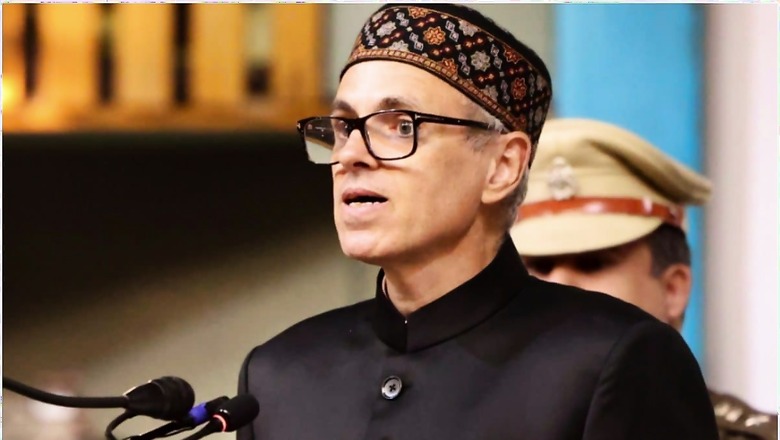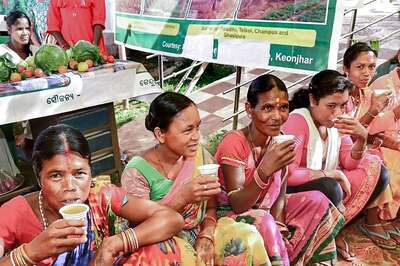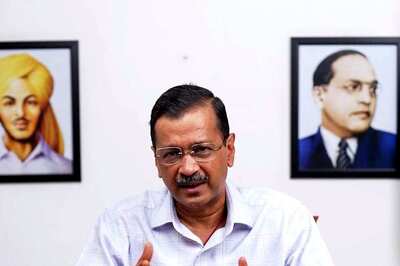
views
Omar Abdullah has taken oath as the first Chief Minister of Jammu and Kashmir post the abrogation of Article 370. As CM, Omar Abdullah will preside over a region that has never been more peaceful, more prosperous, more politically cohesive, and more administratively and constitutionally integrated with the mainland since the “troubles” erupted in the 1980s.
Another significant first is that Omar Abdullah has secured office in what is considered one of the fairest and most representative elections ever held in J&K since the 1970s. Historically, no government in J&K has ruled without sharing power with the party at the Centre. As such, Chief Minister Abdullah enjoys a level of legitimacy that no previous incumbent has experienced.
If there is any constraint upon him, then it is purely the consequence of the constitutional arrangement that has seen Jammu and Kashmir being stripped of its statehood.
Obviously, Omar Abdullah would want the full restoration of statehood for the Union Territory, so that he can exercise authority vested in him by the voting public in full measure.
But how soon statehood is bequeathed upon J&K will also largely depend on the type of CM Omar Abdullah chooses to be. The incumbent CM has interpreted the overwhelming mandate in his favour as support for a few emotive issues championed by his party, the National Conference. Abdullah’s assessment has been peddled and amplified as gospel by several analysts.
Will Omar, therefore, decide to appeal to the Kashmiri sub-nationalist sentiment by becoming an implacable advocate for the restoration of Article 370, for the freeing of dangerous Islamist separatists, or for the resumption of cross-LoC trade with Pakistan?
If the CM becomes fixated on these ideological stances, he might find the Centre none too pleased. The immediate consequence will be a reluctance on the part of the Narendra Modi-led NDA to empower him as the head of a full-fledged state of J&K.
The possibility of an impending difference of opinion looms large as there is no denying that Omar Abdullah is under pressure from his own cadre and non-BJP, mostly Valley-based, Kashmiri regional parties to pursue a more Valley-centric agenda in office.
These vaunting expectations are a natural consequence of the fact that the National Conference has swept one part of the territory, thus preventing it from bridging the divide between Jammu and Kashmir.
The Abdullahs may call out the BJP for being, in their words, a “divisive communal force”, but the National Conference under their leadership is also far from an all-inclusive, pan-state entity. Hindu voters, the majority in Jammu, have displayed a reluctance to accept that Omar Abdullah can safeguard their interests.
The data speaks for itself. The National Conference-led alliance won only 24 per cent of the vote in Hindu-dominated seats in Jammu. Its gains were mostly from Muslim-majority areas of Jammu, where it secured over 40 per cent of the total votes polled. In the Muslim-dominated Kashmir Valley, of course, it swept the board. Far from the wholesale rejection of the BJP that the NC and Congress were expecting, the BJP has emerged as the biggest winner in Jammu, improving on its 2014 vote and seat share.
The statistics also provide an insight into the differing priorities of voters in the two halves of Jammu and Kashmir. The schizoid result clearly demonstrates that, unlike their Kashmiri counterparts, Jammu voters do not feel an overwhelming desire to return the region to the perceived parochialism of a pre-Article 370 arrangement with the Centre. Moreover, Jammu residents do not feel particular empathy for the legion of jailed Islamist separatists, nor a burning desire for rapprochement with Pakistan.
This verdict from Jammu needs to be heard and, more importantly, respected.
Indeed, the election may have been a victory for “jhamooriyat” (democratic free will), but it did little to redeem the region’s frayed syncretism or Kashmiriyat.
The stark divergence in the aspirations of Kashmiris and Jammu residents is a major rupture that must be managed with a sensitive, bipartisan approach to governance. Abdullah has begun well by giving proportionate representation to Jammu legislators in his cabinet.
The equitable distribution of cabinet berths aligns with Omar Abdullah’s vow that he wants to be the chief minister “for all the people all of the time”. But for “Kashmiriyat” to truly redeem itself, Abdullah will have to go beyond optics. The very future of Jammu and Kashmir depends upon it.
Views expressed in the above piece are personal and solely those of the author. They do not necessarily reflect News18’s views.




















Comments
0 comment